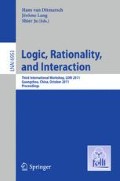Abstract
In various argumentation systems, under most of situations, only the justification status of some arguments of the systems should be evaluated, while that of other arguments is not necessary to be figured out. Based on this observation, we introduce an efficient method to evaluate the status of a part of arguments in an argumentation framework. This method is based on the notion of unattacked sets of an argumentation framework and the directionality criterion of argumentation semantics. Given an argumentation framework and a subset of arguments within it, we firstly identify the minimal set of arguments that are relevant to the arguments in this subset (called the minimal unattacked set). Then, under an argumentation semantics satisfying the directionality criterion, the set of extensions of the sub-framework induced by the minimal unattacked set (called a partial semantics of the original argumentation framework) can be evaluated independently. Then, we analyze two basic properties of the partial semantics of argumentation: monotonicity and combinability.
Access this chapter
Tax calculation will be finalised at checkout
Purchases are for personal use only
Preview
Unable to display preview. Download preview PDF.
References
Amgoud, L.: A formal framework for handling conflicting desires. In: Nielsen, T.D., Zhang, N.L. (eds.) ECSQARU 2003. LNCS (LNAI), vol. 2711, pp. 552–563. Springer, Heidelberg (2003)
Amgoud, L., Dimopoulos, Y., Moraitis, P.: A general framework for argumentation-based negotiation. In: Rahwan, I., Parsons, S., Reed, C. (eds.) Argumentation in Multi-Agent Systems. LNCS (LNAI), vol. 4946, pp. 1–17. Springer, Heidelberg (2008)
Amgoud, L., Prade, H.: Using arguments for making and explaining decisions. Artificial Intelligence 173(3-4), 413–436 (2009)
Baroni, P., Giacomin, M.: On principle-based evaluation of extension-based argumentation semantics. Artificial Intelligence 171(10-15), 675–700 (2007)
Baroni, P., Giacomin, M.: Semantics of abstract argument systems. In: Rahwan, I., Simari, G.R. (eds.) Argumentation in Artificial Intelligence, pp. 25–44. Springer, Heidelberg (2009)
Baroni, P., Giacomin, M., Guida, G.: Scc-recursiveness: a general schema for argumentation semantics. Artificial Intelligence 168(1-2), 162–210 (2005)
Bench-Capon, T., Dunne, P.E.: Argumentation in artificial intelligence. Artificial Intelligence 171(10-15), 619–641 (2007)
Boella, G., Kaci, S., van der Torre, L.: Dynamics in argumentation with single extensions: Abstraction principles and the grounded extension. In: Sossai, C., Chemello, G. (eds.) ECSQARU 2009. LNCS, vol. 5590, pp. 107–118. Springer, Heidelberg (2009)
Boella, G., Pigozzi, G., van der Torre, L.: Normative framework for normative system change. In: Proceedings of the AAMAS 2009, pp. 169–176 (2009)
Bondarenko, A., Dung, P., Kowalski, R., Toni, F.: An abstract, argumentation-theoretic approach to default reasoning. Artificial Intelligence 93, 63–101 (1997)
Caminada, M.: Semi-stable semantics. In: Proceedings of the COMMA 2006, pp. 121–130. IOS Press, Amsterdam (2006)
Caminada, M.: An algorithm for computing semi-stable semantics. In: Mellouli, K. (ed.) ECSQARU 2007. LNCS (LNAI), vol. 4724, pp. 222–234. Springer, Heidelberg (2007)
Capobianco, M., Chesñevar, C., Simari, G.: Argumentation and the dynamics of warranted beliefs in changing environments. Journal of Agents and Multi-agent Systems 11(2), 127–151 (2005)
Dung, P.: On the acceptability of arguments and its fundamental role in nonmonotonic reasoning, logic programming and n-person games. Artificial Intelligence 77(2), 321–357 (1995)
Dung, P., Kowalski, R., Toni, F.: Dialectic proof procedures for assumption-based, admissible argumentation. Artificial Intelligence 170(2), 114–159 (2006)
Dung, P., Mancarella, P., Toni, F.: Computing ideal sceptical argumentation. Artificial Intelligence 171(10-15), 642–674 (2007)
Dunne, P., Hunter, A., McBurney, P., Parsons, S., Wooldridge, M.: Weighted argument systems: Basic definitions, algorithms, and complexity results. Artificial Intelligence 175(2), 457–486 (2011)
Egly, U., Gaggl, S., Woltran, S.: ASPARTIX: Implementing argumentation frameworks using answer-set programming. In: Garcia de la Banda, M., Pontelli, E. (eds.) ICLP 2008. LNCS, vol. 5366, pp. 734–738. Springer, Heidelberg (2008)
Kakas, A.C., Miller, R., Toni, F.: An argumentation framework for reasoning about actions and change. In: Gelfond, M., Leone, N., Pfeifer, G. (eds.) LPNMR 1999. LNCS (LNAI), vol. 1730, pp. 78–91. Springer, Heidelberg (1999)
Kim, E., Ordyniak, S., Szeider, S.: Algorithms and complexity results for persuasive argumentation. Artificial Intelligence 175(9-10), 1722–1736 (2011)
Liao, B., Huang, H.: Angle: An autonomous, normative and guidable agent with changing knowledge. Information Sciences 180(17), 3117–3139 (2010)
Liao, B., Jin, L., Koons, R.: Dynamics of argumentation systems: A division-based method. Artificial Intelligence 175(11), 1790–1814 (2011)
Modgil, S., Caminada, M.: Proof theories and algorithms for abstract argumentation frameworks. In: Rahwan, I., Simari, G.R. (eds.) Argumentation in Artificial Intelligence, pp. 105–129. Springer, Heidelberg (2009)
Modgil, S., Luck, M.: Argumentation based resolution of conflicts between desires and normative goals. In: Rahwan, I., Moraitis, P. (eds.) ArgMAS 2008. LNCS(LNAI), vol. 5384, pp. 19–36. Springer, Heidelberg (2009)
Wakaki, T., Nitta, K.: Computing argumentation semantics in answer set programming. In: Hattori, H., Kawamura, T., Idé, T., Yokoo, M., Murakami, Y. (eds.) JSAI 2008. LNCS(LNAI), vol. 5447, pp. 254–269. Springer, Heidelberg (2009)
Author information
Authors and Affiliations
Editor information
Editors and Affiliations
Rights and permissions
Copyright information
© 2011 Springer-Verlag Berlin Heidelberg
About this paper
Cite this paper
Liao, B., Huang, H. (2011). Partial Semantics of Argumentation. In: van Ditmarsch, H., Lang, J., Ju, S. (eds) Logic, Rationality, and Interaction. LORI 2011. Lecture Notes in Computer Science(), vol 6953. Springer, Berlin, Heidelberg. https://doi.org/10.1007/978-3-642-24130-7_11
Download citation
DOI: https://doi.org/10.1007/978-3-642-24130-7_11
Publisher Name: Springer, Berlin, Heidelberg
Print ISBN: 978-3-642-24129-1
Online ISBN: 978-3-642-24130-7
eBook Packages: Computer ScienceComputer Science (R0)

